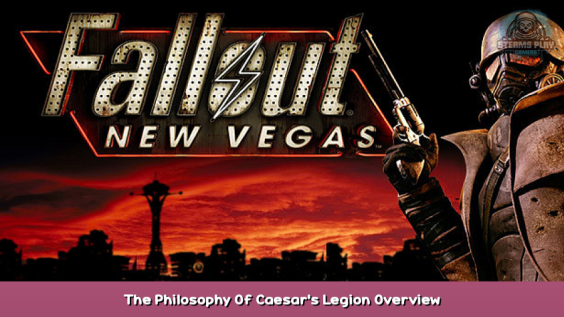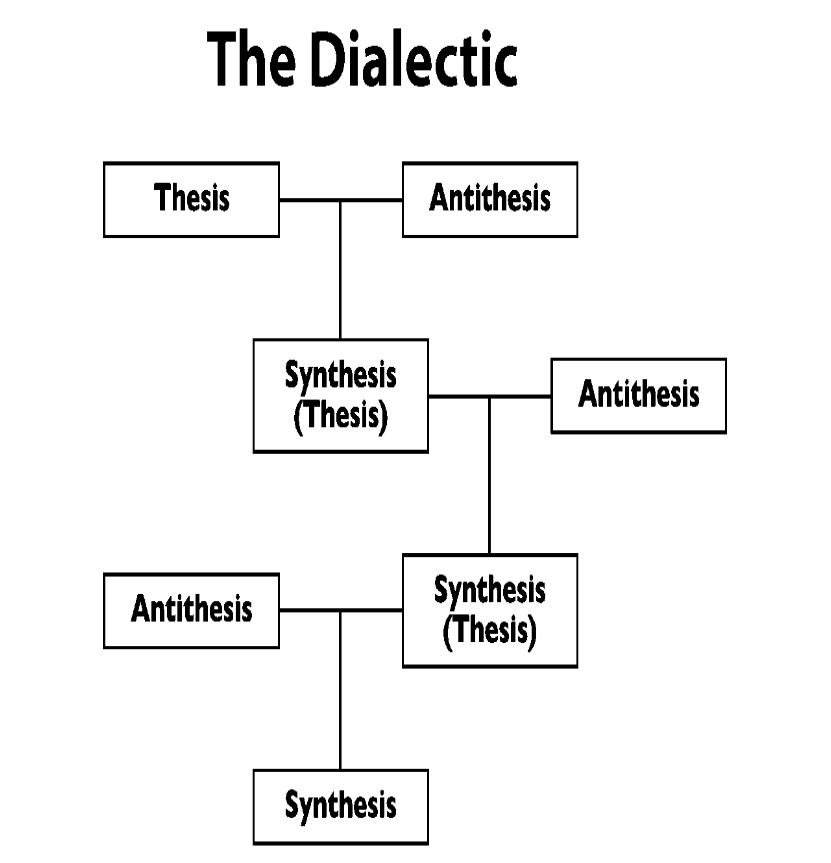
What does Caesar’s Legion have to say about the big questions that concern human relationships, questions about justice, societal harmony, and governments? In this guide, I will be examining the philosophy of Caesar’s Legion.
I. Introduction
When traveling the Mojave, we find factions competing with one another. Each faction symbolizes a concept, a metaphysical ideology that cannot be known through sensory experience. The essence of each faction lies in its philosophy. What does Caesar’s Legion have to say about the big questions that concern human relationships, questions about justice, societal harmony, and governments? In this guide, I will be examining the philosophy of Caesar’s Legion. I will investigate many critical philosophical concepts used in Caesar’s Legion and offer objections to Caesar Legion’s political philosophy. As a fellow lover of philosophy, I hope this guide will be an enjoyable and intellectually pleasing read that will enrich your experience in your next fallout playthroughs to come.
II. Political Philosophy
“The individual has no value beyond his utility to the state, whether as an instrument of war or production.”
– Fallout New Vegas, Caesar.
The political philosophy of Caesar’s Legion first begins with its structure of power. Caesar’s initial inspiration was viewing forms of government in ancient Rome. At one point in time, the Roman government had evolved to a centralized imperial authority, where an emperor had held most of the state’s power. Caesar then used this part of Roman history as a guiding template and created a state where power was centralized and dictatorial, demanding complete subservience from its citizens to the state. It is necessary to note, however, that while ancient Roman politics and culture were a significant source of inspiration for Caesar, he did not seek to imitate the Roman empire in all of its entirety.
Caesar redefines historical terms such as Pax Romana in the game and other details that make Caesar subject to portraying historical inaccuracies (this will be explained in greater detail later on). The key takeaway about Caesar’s fascination with ancient Rome was that he saw political concepts in the Roman empire that he believed could produce long-term survival for societies existing in a post-apocalyptic world like the one in Fallout New Vegas.
Caesar’s Legions’ structure of power would not be complete without Caesar’s assertion of fundamental values for citizens, that the only real virtue worth striving for is one’s own utility to the state. Caesar believes that his political theory is not only a means of creating an efficient state, but it is the remedy and solution for preventing another war like the one existing in the previous world. The previous world (or referred to as pre-war) had been destroyed, and we must know why as not to repeat it.
Caesar believes that at its core, the fundamental problem that led to the previous atomic war was due to mass societal division (people were not operating as ‘collectives’). In Caesar’s view, group identity was the stepping stone to mass societal division, which then facilitates warfare (both global and civil) as people will continue to segregate from each other and develop hostility towards other groups. Naturally, the human being is prone to wanting a sense of identity, and this natural inclination towards identity will express itself through group identity.
In Caesar’s view, the problem of personal identity and group identity acts as a way of diverging society from working as one collective, hence why Caesar’s Legions assert that there is no virtue or “the good” except for that which serves to benefit the state. Caesar believes that if we can eliminate group identity and personal identity all the while redirecting our longing for identity towards one singular, dominant, and shared ideology, then there will be no reason to divide amongst each other. Caesar then asserts that the only rational solution to the problem of identity being a prime mover for inner societal division is to establish what Caesar calls a “Pax Romana.” (Caesar redefines a known term that refers to a time of peace during the Roman Empire).
Courier: What does “Pax Romana” mean?
Caesar: It means a nationalist, imperialist, totalitarian, homogeneous culture that obliterates the identity of every group it conquers.
– Fallout New Vegas, Caesar, Dialogue
This concept of conquering and assimilating other cultures into one dominant culture serves as a powerful cog in the machine that is the political theory of Caesar’s Legion. Caesar’s Legion will effectively (through the use of military) conquer raiders and take them as captives of war. These captives of war will then be assimilated into the culture and political beliefs of Caesar’s Legion. Captives will rise through the ranks and attain virtue and will be subservient to the state. All members will act as one ultimate collective, virtue is for the state, production is for the state, and if everyone believes and accepts that there is no greater ideal than that of the state, then unity will be its product, not division.
III. Hegelian Dialectics
“No, I’ll destroy it because it’s inevitable that it be destroyed. It’s Hegelian Dialectics, not personal animosity.”
– Fallout New Vegas, Caesar
Hegelian Dialectics can be thought of as a system of logic that belongs to the science of logic. Hegelian Dialectics is employed by the 19th Century German philosopher G.W.F. Hegel. It is a form of reasoning that one can employ in the mind and the world itself, as Hegel believed reasoning exists both in the mind and in the world itself. It is a system of logic that aims to help people find absolute truths or universals.
The purpose of this guide is to explore the philosophy of Caesar’s Legion. Though Hegel was influenced by Fichte, Caesar’s explanation of what he refers to as “Hegelian dialectics” would be closer to the ideas of the philosopher Fichte than Hegel, given his triadic view and use of language in his dialogue with the courier (thesis, antithesis, synthesis, etc.) Since this is a deep dive into the philosophy of Caesar’s Legion, I will talk about both Hegel and Fichte but will stay more so on the side of Fichte, as Caesar’s views are more closely aligned with Fichte’s triadic “thesis-antithesis-synthesis” language.
On Hegelian Dialectics
You can think of it as a logical system that seeks to refine concepts to their absolute form, a state of completeness. In many applications of Hegelian Dialectics, the primary component of the dialectical process is driven by necessity, a force moving toward a necessary logical conclusion where logic has reached its highest application, forging an absolute truth. Think of it as a logical process that is driven by a syntactical necessity, a system that forces logical exhaustion until its final evolution is a finalized concept.
Hegel believed that reason necessarily generates contradictions, and when concepts generate their own contradictions, there is a process in which the concept and its inherent contradiction interlocks with itself, which then creates a better or more refined concept, a concept that has successfully eliminated its own inherent flaws, yet preserving that which is not contradictory. In Hegel’s view, this dialectical method can also be applied to the world, as the world itself has reason.
On Fichte
Hegel often criticized formulaic methods that put dialectical methods into three stages or phases, which can take away from the purpose of its process, which is to allow reason to flow freely to its necessary conclusion. Caesar discusses the dialectical process with a triadic terminology like the philosopher Fichte, seeing three sides or three moments, formulating them into a thesis, antithesis, synthesis.
“Each dialectic begins with a proposition, a thesis… …which inherently contains, or creates, it’s opposite – an antithesis. Thesis and antithesis. The conflict is inevitable. But the resolution of the conflict yields something new – a synthesis – eliminating the flaws in each, leaving behind common elements and ideas.”
– Fallout New Vegas, Caesar.
The form or presentation of this analytical method of reasoning is demonstrated in three sides, or stages, what Caesar refers to as “thesis, antithesis, and synthesis.” In this analytical method of reasoning, a thesis can be formed from an initial concept, and an antithesis can be that concept’s contradiction. The thesis can be thought of as a positive, while the antithesis can be negative. These two concepts, both positive and negative (thesis and antithesis), will both draw out each other opposing elements, and in light of these opposing elements, will form a type of resolve between the two concepts through a concept of divisibility that seeks to merge the two sides, giving way to a third concept referred to as the synthesis.
When both concepts “synthesize,” it results from a necessary forcing of contradicting ideas. However, in light of the concept’s opposites, reason finds a way to also take into account that which is similar or alike. This method of dialectics has within it the necessary drive to determine a third synthesized concept that comes into being by examining its contradictions, which also reveal its similarities.
Contradiction is then not seen as an acceptable reason to abandon a concept or to perceive it as an indication to use another form of inquiry. Instead, contradiction is used as a means of understanding the concept more by producing a third concept from divisibility by examining the contradictions within the thesis, which will then create its anthesis. Take a look at some of the examples below to illustrate this analytical method of reasoning better.
Example 1:
- Thesis : Water is a liquid
- Anthesis: Well when water is boiled at 100 degrees celsius water transitions from liquid to gas.
- Synthesis: Water can be either liquid or gas depending on the temperature.
However, this logical process can be done more than once, which can be thought of as one complete circuit or circle, when a concept has been synthesized and a refined concept is created, it can be repeated (as the concept will naturally have within itself contradictions).
Example 1 (continued):
- Thesis : Water can be either liquid or gas depending on the temperature.
- Anthesis: Well when water is cold enough it can freeze making it a solid
- Synthesis: Water can be a liquid, gas or solid depending on the temperature.
IV. Moral Theory
My Legion obeys me, even unto death. Why? Because they live to serve the greater good, and they know of no alternatives.
– Fallout New Vegas, Caesar.
What is Caesar’s Legion moral theory? Moral theories offer a framework that deals directly with questions of what a person ought to do. Therefore, Caesar’s Legion offers the following when establishing a purpose of morality and ethics. Caesar’s Legion asserts that all actions must benefit the state, and actions that interfere or are against the state’s interest are wrong as this will impact the greater good or the overall collective of members of Caesar’s Legion. Caesar’s Legion defines morality by one’s actions and how those actions either serve or impede the state’s interest, impacting the greater good of the collective.
The moral theory aims to facilitate actions that promote individuals to function as one common collective and perform beneficial actions for the state. All actions from the individual are not for the individual but for the greater collective and the state itself. Caesar’s moral theory provides its members with a sense of purpose, and it is a crucial part of its overall philosophy.
The moral philosophy of Caesar’s Legion acts as an effective way of dealing with the problem of identity, as mentioned in his political philosophy. Members view morality through a lens of objective actions, with little to no care for one’s own innate desires. Since the political philosophy deals directly with Caesar’s assertion of the problem of identity causing societal division, morality is then determined by one’s actions and how these actions affect the state and the overall collective.
V. Eugenics
Eugenics is the selection of desired heritable characteristics within a human population to improve future generations. Caesar’s Legion has strict views on technology and medical sciences and their relation to its society. One primary purpose that Caesar’s Legion sets out to do is to create long-term stability. Caesar seeks to fix the issues of the previously destroyed world by creating a society that can survive and stay unified. Therefore, strength is a virtue that Caesar’s Legion highly admires as it ensures survival, leading to long-term survivability. Caesar’s Legion holds a view that is not too far from Darwinism, that only the strongest of a population can and will survive. Those who are unfit and incapable of survival will die out, leaving only the best to reproduce.
Caesar’s Legion seeks to take matters into their own hands by rejecting medical science, as medicine is viewed as a crutch, allowing those who are inherently weak to thrive and reproduce. Allowing the existence of weak individuals who will use the resources of the Legion is only to hinder the Legion, not benefit it. Therefore, medicine is largely prohibited, such as Stimpacks, as this will help prevent those deficient from dying out. Caesar’s Legions eugenics’ primary goal is to leave behind only those who possess the strength to survive and endure.
VI. Objections (problematic areas in Caesar’s philosophy)
1. Political Theory
The autocratic, militarized, totalitarian political theory of Caesar’s Legion seeks to solve the problems of the previous world by destroying the identity of every group it conquers, thereby ceasing societal division. It defines that a central problem to the human condition is the problem of societal division, which comes from both group identity and individual identity. Therefore Caesar argues that a solution in which a culture conquers and assimilates other cultures into one primary collective is the primary solution to the problem of societal division, as the division will never cease until divided groups of people become hostile towards each other.
The problem with Caesar’s solution is his method of creating unity. How can the legion guarantee that there will be no group identity or personal identity formation in conquered groups or individuals despite the attempts to be fully assimilated by the Legion? Caesar’s Legion can only believe that an individual is assimilated based on individual actions; it cannot account for the beliefs or inner thoughts one can have once forcibly captured. It can appear as though a person accepts a philosophical belief by their words, their actions. Nevertheless, how they view the world is a matter that exists in one’s self, in their own mind, actions are outwards, but one’s inner dialogues and beliefs can be hidden out of fear of punishment.
Caesar’s Legion conquers and captures people who have lived a life outside of the norms and beliefs of the Legion. Aside from children, conquered individuals had already experienced an entire vast world and have adopted principles, beliefs, and worldviews. To assume that all conquered groups and individuals will shed all forms of identities and replace them with the ideologies of the Legion is difficult in actual practice. It is also possible for children born into the Legion to have differing views internally, have desires that are (under the legions views) morally wrong, and can contemplate and reflect when they become older.
The Legion may indoctrinate children to a specific set of beliefs, but they cannot remove one’s own ability to think for themselves. A person still can think freely on their own, which opens the possibility that a person indoctrinated by the Legion at birth can still object to some of the Legion’s principles if they can critically think about the Legion and have some degree of skepticism. The Legion may be able to shackle those who attempt to suppress them, but they can never suppress one’s thoughts.
The notion of conquering other groups who have already been exposed to a wide array of different belief systems and expecting them to shed all of it in place of a foreign philosophy and belief system is dubious. Therefore, the Legion cannot guarantee the removal of tribal identities or individualistic forms of identity. Division can then still occur, making Caesar’s claim that members who operate as one collective and only dedicate themselves to the state to solve the problem of societal division is not a feasible solution.
2. Eugenics
If humankind can use their reason to create tools to improve their survival in the environment, is this not power and resilience?
The Legion’s eugenics begins to fall apart when you examine it beyond its surface level. Some common lore would suggest that Caesar’s Legion allows the use of medicine and technology in emergencies. However, since medical sciences and technology are not at the forefront of Caesar’s Legion, it makes rational sense that much of the resources of Caesar’s Legion will not go into medical research or medical development. Diseases continue to evolve and require vigilante scientific research as new viruses and other infectious diseases emerge globally. If Caesar’s Legion is dismissive of medical sciences, it follows that it will not have a vested interest in creating its own medicines or performing scientific research. Other factions may not share the same view the Legion does towards technology and medicine, which can be a weakness that other factions can take advantage of in the context of conquest.
One could also argue that the death rates that come with a new disease outbreak (a disease not seen in the previous pre-war world) will leave behind stronger soldiers and those who can survive. The problem of this argument assumes that disease outbreaks will be met with sufficient recovery time and the possibility that large amounts of people who are still healthy enough to fight will be able to defend the Legion. It is plausible that the Legion can suffer from an infectious outbreak of disease while also facing an economic crisis, like famine, putting the Legion in a unique state of vulnerability. Rival nations can then successfully conquer the Legion, especially those advanced in medicine and more likely to be immune to the outbreak.
The current primitive use of technology and medicine becomes a weakness for the Legion that other conquering nations can exploit. In this plausible scenario, the primitive views and restrictions on medicine and technology become a detriment to the Legion, not its strength. Caesar himself acknowledges the advantages of tech and medicine and keeps an Auto-Doc in his tent and, depending on the player’s choices, can lengthen Caesar’s life in the quest Et Tumor, Brute?
VII. Conclusion
In conclusion, I analyzed and summarized key arguments that pertain to the overall philosophy of Caesar’s Legion. In this guide, I examined the political philosophy, moral philosophy, and eugenics of Caesar’s Legion and clarified many of the references to Hegelian dialectics in the context of Caesar’s Legion. When examining Caesar’s political theory and hearing his arguments made with the courier, it becomes evident that the political theory sets out to solve the problem of societal division by assembling a totalitarian homogenous culture that conquers and assimilates other cultures into one prime collective.
I have also explored Caesar’s Legion’s moral philosophy and its view on how actions can be morally wrong or right depending on how that action relates to the benefit of the state and its collective. I have also examined the Legion’s eugenics, which seeks to breed only the “best” from its population; the “best” which is defined as those who have the strongest capabilities of surviving, as this will effectively weed out those who are weak and are far from being considered the “best.”
Towards the end of this guide, I offered a few critical objections to Caesar’s Legion’s political philosophy and eugenics. It is hard to write a guide on the philosophy of a faction without engaging with it as a form of debate. I hope the refutations section of this guide helped you to engage more with the overall philosophy of Caesar’s Legion, and as a result, learn more about its philosophy.
I believe I speak for many of us, that we greatly appreciate the developers who had put so much thought into the game, especially into factions such as Caesar’s Legion. At any point in time, for convenience sake, the developers could have used any faction and point to it and tell us, “those are the bad guys.” Instead, we are given ample choices to define who is or what is “bad” and given factions like Caesar’s Legion, in which a ten-page guide does not do justice to the heavy amount of philosophy that exists within it. Sure there are issues in some areas, such as the references to “Hegelian” dialectics. Nevertheless, it was the thought and care the developers had put into creating a vast world filled with various philosophies that players still get into debates about to this very day. That is a sign of genuine care and craftsmanship that I only hope future game designers will continue to do moving forward.
Additional Resources



Here we come to an end for Fallout: Fallout: New Vegas The Philosophy Of Caesar Legion Overview Legion hope you enjoy it. If you think we forget something to include or we should make an update to the post let us know via comment, and we will fix it asap! Thanks and have a great day!
- Check All Fallout: New Vegas Posts List



Leave a Reply